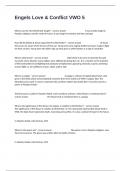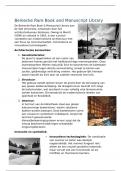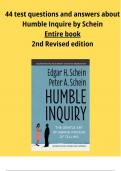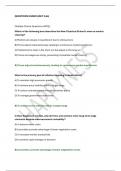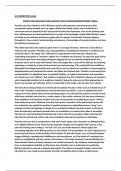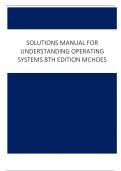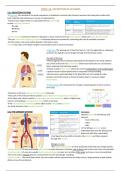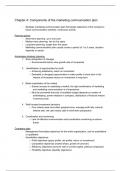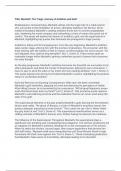Where was the First World War fought? - correct answer It was mainly fought in
Flanders, Belgium and the north of France. It was fought in trenches and they used gas
How did the British at home regard the First World War? - correct answer At home
they were nor aware of the horrors of this war. Young men were eagerly drafted and were ready to fight
for their country. Young men who didn't sign up were given a white feather as a sign of cowardice
What is shell shock? - correct answer Shell shock is the term to describe the post
traumatic stress disorder many soldiers were afflicted by during the war. It is a reaction to the intensity
of the bombardment and fighting that produced a helplessness appearing variously as panic and being
scared, flight, or an inability to reason, sleep, walk or talk.
What is a poppy? - correct answer A poppy is a flower,red petals,black heart, that
grew in the fields which werecompletely ruined by the trench warfare of WWI. A poppy 'likes' the
disturbed, poor earth. It came to represent the sacrifices soldiers had made after it was first used in a
poem 'In Flanders Fields"
The first poem is called 'In Flanders Fields' and it mentions a flower, which flower is mentioned here? -
correct answer The flower that is mentioned here is a poppy
What is the significance of this flower, the poppy, in relation to World War I? - correct answer
The significance of this flower in relation to World War I is: The read petals representthe blood shed in
WWI, the black heart represents death, mourning and sacrifice. It is also a symbol of hope for the future.
In Flanders Fields, John McCrea 1915
Where is this poem set? - correct answer The poem is set In Flanders, Belgium, near
Ypres to be precise. The poem was written after the battle of Ypres.
In Flanders Fields, John McCrea 1915
,Who is the speaker of this poem and to whom is this poem addressed? - correct answer
.The speaker is first the narrator, the poet himself, who addresses the reader. Later the speaker is a
fallen soldier who addresses his fellow soldiers
In Flanders Fields, John McCrea 1915
Describe what you 'see' in the first stanza?
In Flanders Fields
In Flanders fields the poppies blow
Between the crosses, row on row,
That mark our place; and in the sky
The larks, still bravely singing, fly - correct answer In the first stanza we see a war
cemetery where poppies grow between the graves. These graves mark the deaths of soldiers who
fought there. The lark symbolises their rebirth
In Flanders Fields, John McCrea 1915
What does "the passing of the torch" in the last stanza mean? - correct answer .the
passing of the torch" means; keep on fighting, continue our fight
In Flanders Fields, John McCrea 1915
What does the poet mean when he says:
If ye break faith with us who die
We shall not sleep, though poppies grow
In Flanders fields. - correct answer Here the poet means: if you do not keep on
fighting, the dead soldiers will not rest in their graves, their deaths would be in vain.
In Flanders Fields, John McCrea 1915
,What message is the speaker trying to give? - correct answer The message is: Do
not get discouraged by the death of soldiers, but fight on and see death in the light of rebirth. Like the
poppy, life will go on.
imagery: - correct answer This is a literary device where language is used that
stimulates thereader's senses, the language creates a picture in the reader's head.
metaphor: - correct answer a figure of speech that compares one thing to another
for rhetorical effect
Dulce et Decorum Est - correct answer The poem is a harrowing and vivid account
of a poison gas attack, with a number of details which immediately stick in the memory, and haunt our
dreams as they haunted Wilfred Owen's, showing how naive and damaging outlooks of other poets and
the people at home really were.
What do you think the following words and phrases mean:
knock-kneed
a hag
the sludge
the haunting flares
to trudge
to limp
fatigue
hoots
to flounder
dim
to plunge at
guttering
smothering
writhing
, obscene
the cud
zest
ardent - correct answer a.knock-kneed = when you walk with your knees touching
each other, an unsteady walk
b.a hag = old, bent woman
c.the sludge = muddy, wet soil
d.the haunting flares = the flames (Germans shot flames in the air to light up the area) always close
behind you
e.to trudge = walk heavily
f.to limp = walk with difficulty
g.Fatigue = very tired
h.hoots= siren, high sounds of guns
i.to flounder = being very confused, struggling
1.Dim = weak, pale, dull
2.to plunge at = jump at, drop towards
3.Guttering = vomiting like, fluids coming out of your mouth
4.Smothering = unable to breathe
5.Writhing = making twisting movements with your body
6.Obscene = offensive, rude
7.the cud = half digested food in your stomach returning to mouth
8.Zest = enthusiasm, eagerness
9.Ardent = feeling strongly about something
Dulce et Decorum Est, Wilfred Owen summary: - correct answer Dulce et Decorum
Est" by Wilfred Owen is a poem about the horrors of war as experienced by a soldier on the front lines
of World War I.
The speaker depicts soldiers trudging through the trenches, weakened by injuries and fatigue.

